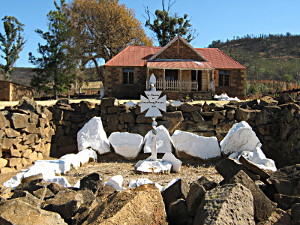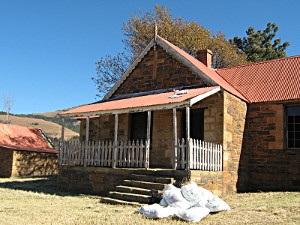O'Neil's Cottage Near Volksrust: A Symbol of War, Healing, and Diplomacy
Situated on the rugged terrain near Volksrust, O'Neil's Cottage stands as a testament to a pivotal moment in South African history during the Transvaal War of Independence (1880-81). This unassuming structure carries the weight of stories from a time when the fate of nations was decided not in opulent palaces or grand assembly halls but in the intimate confines of humble homes.
During the Transvaal War of Independence, O'Neil's Cottage, once the cherished abode of Eugene O'Neill, found itself in a delicate position. Located in “no man's land” between the warring British and Burgher forces, the house inadvertently bore witness to the changing tides of conflict.
The cottage's significance is multifold. After the British faced defeat at Majuba, this quaint dwelling evolved from a mere residential structure into a sanctuary for the wounded. Within its walls, injured soldiers found respite and medical care. The surrounding area became hallowed ground, with graves marking the final resting place of those who didn't survive.
Among these graves, a particularly poignant spot exists. A small stone-walled graveyard near the front door of the cottage serves as the resting place for three soldiers of the King's Royal Rifles. Buried there by their fellow soldiers, they remain, even today, a silent testament to the price of war and the bonds of brotherhood.
Yet, the narrative of O'Neil's Cottage is not just of warfare and tragedy. The very walls that echoed the moans of wounded soldiers later resonated with the voices of diplomacy and hope. Over 21 days in March 1881, its humble parlor became the backdrop for intense negotiations. Key figures of that era, including Paul Kruger, Marthinus Pretorius, and Commandant Gen. Piet Joubert from the Burgher side, sat alongside their British counterparts such as Gen. Sir Evelyn Wood, Col. R. Buller, Major Clarke, and Capt Roberts. The outcome of their deliberations was a peace treaty, a beacon of reconciliation in turbulent times.
In the vast panorama of history, grand edifices often eclipse places like O'Neil's Cottage. However, it is here, in these seemingly inconspicuous corners, that we find the true essence of history. O'Neil's Cottage serves as a reminder of the resilience of the human spirit, the horrors of war, and the power of dialogue.
Now, as one stands near Volksrust, amidst the rough landscape, the serenity of the present might seem in stark contrast to the tumultuous past. But there stands O'Neil's Cottage, a poignant reminder of a time when battles were not just fought on battlegrounds but also negotiated across humble tables.

